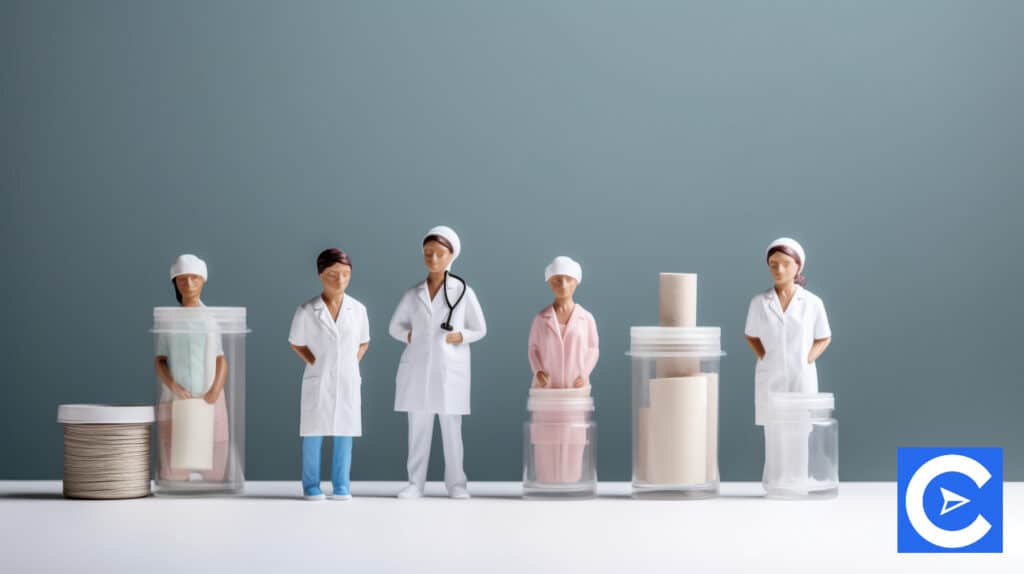Hi guys, welcome to today’s exciting read, where you’ll learn how to become a Nurse Innovator!
At the end of reading this article, you’ll come to fully understand what innovation in nursing is, the functions of Health Innovators, the steps to becoming a Nurse Innovator, and the salary these nurses earn.
In this article, we’ll focus on:
- What Is a Nurse Innovator?
- Qualities of a successful Nurse Innovator
- Duties of Nurse Innovators
- Salary and Career Outlook of Nurse Innovators
Let’s jump into this enlightening read to know how to become a nurse practitioner in this career path!
[hubnav]
What is a Nurse Innovator?

The introduction of professional nursing in the mid-nineteenth century was the most revolutionary transformation in healthcare delivery in the world’s history.
The idea of utilizing a corps of educated healthcare professionals or clinicians that have gone through the school of nursing to offer the increasingly complex, technological care expected by modern scientific medicine was groundbreaking in an era when most people relied on family members to care for them.
Nurse Practitioners who are innovators are on the front lines of healthcare and health, which gives them tremendous opportunities to use innovation to improve health and wellness, create and design new approaches to care delivery, and communicate health information in a way that the general public, patients, and their family members can understand.
Nurse Innovators are more important than ever as the US and the world enter a new era of healthcare challenges caused by the COVID-19 pandemic.
Natural Innovators in the healthcare sector have a long history of developing novel ways to advance health and meet ever-changing human needs.
A Nurse Innovator is a Registered Nurse who focuses on bringing about positive change in health care equity and quality by addressing the unmet needs of a target population with new processes, services, and products.
In order to improve diagnosis, treatment, outreach, education, research quality and delivery, prevention, and access to healthcare, healthcare innovations should yield scalable solutions and improvements in health systems, policies, technologies, products, delivery methodologies, and services.
The goal of innovation is to come up with new technologies and ideas that boost productivity and generate more output and value from the same amount of resources.
Healthcare innovations can boost economic growth by increasing efficiency and productivity while also improving patient outcomes.
Simply put, health innovation’s ultimate goal is to improve our ability to meet public and personal healthcare needs and demands by improving the health system’s performance.
Today, we relate innovation to new technology, but concepts that improve human health have a long history in nursing.
If innovation is defined by ideas, who then have more ideas than Nurses?
Nurse Innovator Responsibilities

A Nurse Innovator is first an RN (Registered Nurse) before an Innovator.
Job responsibilities of Registered Nurses are:
- Getting patients ready for tests or treatments and making decisions based on the results
- Maintaining a record of the patient’s medical history and symptoms
- Medications and therapies are given.
- Assisting in the creation of care plans
- Using and supervising medical tools and equipment
- Instructing patients and their families on how to manage their diseases and providing follow-up care
- Collaboration with doctors and other medical professionals
- Mentoring other healthcare workers
However, as Innovators RNs act as change agents by driving policies and processes and leveraging technology.
RNs in this nursing field lead within the professional practice setting as collaborative Nurse Leaders, with a defined scope of practice, state-specific nurse practice acts, and nurse-led initiatives.
New drugs, drug delivery systems, diagnostic methodologies, and improved medical devices provide hope for less expensive, painful, and disruptive care and better treatment.
Implanted sensors, for instance, can aid patients in better monitoring their illnesses.
Nurse Innovator Scope of Practice

Apart from a Nurse Innovator’s scope of practice that focuses on bringing positive change in health care quality and equity by addressing unmet needs of a target population with new processes, services, and products, they also observe Registered Nurses’ scope of practice.
RNs are responsible for both clinical and administrative tasks.
In most states, Registered Nurses are responsible for monitoring and administering medications, taking vital signs and recognizing abnormalities, developing care plans, wound care, and basic life support.
Their practices are not expected to exceed these in healthcare establishments.
Where Does a Nurse Innovator Work?

Since Nurse Innovators are primarily Registered Nurses that offer primary care to patients and also APRNs (Advanced Practice Registered Nurses) they can work in any section of the hospital.
Nonetheless, innovation is important for every part of the health sector, particularly in the acute and critical care departments.
The following areas of the healthcare system are areas these Nurses can work in:
- ICU
- Entrepreneurship sections
- Emergency Rooms in hospitals and medical centers
- Critical Care Units
These Nurses also in addition to wrong as Registered Nurses work as Chief Nursing officers, Oncology Nurses, Pediatric Nurses, Clinical Nurse, Nurse Scientists, and Nurse Entrepreneurs.
Healthcare Innovator Requirements

To work as a Registered Nurse, you must have a nursing education.
Nursing students go on to take the NCLEX-RN (National Council Licensure Examination for Registered Nurses) after obtaining an Associate of Degree in Nursing (ADN) or a Bachelor of Science in Nursing (BSN).
The degree you should earn will be determined by where you want to work.
Some states require people to have an Associate’s Degree in Nursing before they can practice, but this is changing rapidly.
More states are now requiring those interested in becoming Nurses to complete a BSN program.
You should enroll in a Registered Nurse school that emphasizes clinical experience, whether you want to be a Pediatric Nurse, an ER Nurse, or a Nurse Innovator.
Due to the degree of competency needed in this nursing field upcoming Nurse Innovators are expected to also go through MSN and DNP nursing degrees.
Aside from these, courses that boost one’s knowledge of innovation and entrepreneurship are also a plus.
These programs are offered in colleges and universities such as the University of Pennsylvania.
Qualities of an Excellent Nurse Innovator

Divergent Thinking
Thinking in a nonlinear fashion or divergent thinking and exploring numerous possibilities rather than settling on a single solution, is a critical component of innovation.
Additionally, divergent thinking fosters creativity and inquisitiveness, both of which are necessary for developing something truly novel.
Many healthcare settings, and even some healthcare organizations, prefer to stick to tried-and-true practices, at least until a near miss occurs.
However, this is an area in which Nurse Innovators can excel.
After all, Nurses are natural problem solvers.
Thus, by incorporating divergent thinking into your ideation process, you’ll be able to anticipate problems rather than simply address them.
Risk-Taking
Divergent thinking can generate ideas that feel risky to put into practice.
When you consider the healthcare industry as a whole, this is understandable.
Risk is frequently viewed as a negative term in the healthcare sector, and risk-taking is widely avoided.
In fact, only a small percentage of Nurses visit the risk management office of their own volition.
Risk is an unavoidable part of innovation and it’s rather important to cultivate a certain level of risk tolerance.
Nurse Innovators, on the whole, are better at managing risks because they’re solution-oriented and take a riskier approach to experimentation encountered while introducing new solutions.
An excellent Nurse Innovator must plan for the risks that may arise as ideas are developed.
Business Strategies
There are medical skills, which include practical experience.
There are also entrepreneurial skills, which include financial, strategic, and operational knowledge.
Both are equally valuable.
Nurse Innovators who want to be successful in this nursing career must have a thorough understanding of healthcare trends and how they affect other patients, processes, and healthcare workers.
They should also have a broad understanding of the system and can spot both roadblocks and opportunities in the current state of affairs.
Collaboration and Teamwork
Even the most Innovative Nurses never work in isolation.
Both innovating and nursing necessitate collaboration.
It takes testing, research, and vetting to bring an idea to life, whether it’s to address patient needs, patients’ family members’ needs, workflows, or how to make everyday practices more efficient.
And these, too, necessitate a variety of viewpoints.
While it’s natural to assume that Physicians, Nurses, Pharmacists, and Physical Therapists should lead healthcare innovation, it also includes Engineers, Statisticians, Business Leaders, and Software Developers who have industry knowledge that healthcare staff lacks.
To succeed in innovation nursing you should have the ability to identify blind spots in your design thinking and help your ideas grow by diversifying who you work with.
Ways to Build Innovative Ideas in Nursing

Nurses are essential in all aspects of health care, from hospitals and doctors’ offices to public health departments, nursing homes, school health clinics, and community centers.
Nurses at all levels must be open to new ways of working and thinking in order to have the skills and confidence to develop new ideas and nursing interventions to work on specific issues beyond their normal responsibilities because their roles in patient care across the health system provide significant opportunities to affect health outcomes.
Innovation is characterized by zeal and curiosity, and it is the result of creativity.
Innovative thinking is a skill that must be practiced, not a talent.
Here are ways to support the development of innovative ideas:
Build on Existing Problems or Questions
When creating innovative projects, it’s critical to clearly define the issues you’re trying to solve and explain why they’re important.
Always begin by answering the why, what, when, and how questions.
Make a list of all the questions that come to mind and then choose the best one.
You’ll have a better eye for possibilities and be more skilled at connecting different ideas if you have a thorough understanding of the question or problem you’re trying to solve.
Think Outside the Box
Encourage yourself to be receptive to new ideas rather than forming preconceived notions.
Write down your ideas and thoughts in your scrapbook or journal, as this will help you keep track of them and may even stimulate your thought processes, resulting in a cascade of new ideas.
You don’t have to follow the rules all of the time to be creative.
It’s all about how you associate different facts and ideas—look for the unusual and embrace the difference.
Be Persistent
Make a commitment to staying in the present moment and not allowing your mind to wander from one thought to the next.
Failure is not something to be afraid of.
Instead, consider mistakes to be opportunities or a part of the learning process that will help you achieve your goal of innovation.
Build a Network
Engage in conversations with a variety of people and pay attention to their unique perspectives, which may aid in the reconstruction of your ideas.
You might be surprised to learn that our most valuable insights come from interactions with people who hold opposing viewpoints.
Also, remember to have fun with your coworkers because this is a tried and true way to generate ideas.
Nurse Innovator Salary and Career Outlook

The average annual pay for a Nurse Innovator in the United States is $67,900 per year as of April 2022.
If you need a quick salary calculator, that works out to about $32.65 per hour.
This equates to $1,309 per week or $5,657 per month.
While some Nurses in this field earn as much as $135,100 per year and others as little as $19,600, the majority of Healthcare Innovators earn between $41,100 and $78,600 per year, with top earners earning $113,100 in the United States.
The average salary for a Nurse Innovator varies widely (up to $37,600), implying that there may be numerous opportunities for advancement and higher pay based on location, years of experience, and skill level.
States such as Chicago and Washington DC earn an average of $79,000 yearly.
Registered Nurses are expected to grow 7-9 percent between 2019 and 2029, which is about the same as the average for all occupations.
Over the next ten years, an average of 194,600 openings for Registered Nurses are expected.
Conclusion

As stated in a report by the International Council on Nursing (ICN), innovation in nursing applications is extremely important for preventing diseases, improving health, developing healthy life standard attitudes, describing and avoiding risk factors, and qualifying the care and treatment methods.
This is because innovation allows for the advancement of knowledge, method, and safety practices.
Healthcare innovations can boost economic growth by increasing productivity and efficiency while also improving patient outcomes.
FAQs

What are the Examples of Nursing Innovations?
Nursing innovations are causing a stir in the industry:
– Post-cancer remission support
– Nurse entrepreneurs inventing new ways to solve problems
– Patient-centered care
– Nurses who work in customer service roles or user-experience roles
– Nurses guiding business decisions
– Streamlining and automating work processes
How Can Nurses Be Innovative?
Nurses need to embrace innovation science as a necessary competency to improve health care quality and equity as innovation is the future of nursing. Innovative nursing behaviors that address organizational and systemic gaps in the healthcare system viewed as workarounds can have nurses at the forefront of healthcare.
What is Innovation in Nursing?
Innovation can be defined as the combination of adoption, diffusion, and invention. It could be a service, novel idea, product, or care pathway in healthcare that has clear advantages over what is currently done. Successful innovations frequently have two key characteristics: they are both desirable and usable.
What Does a Nurse Innovator Do?
The role of a Nurse Innovator is to bring about positive change in the quality and equity of health care by addressing the unmet needs of a target population through the development of new processes, services, and products.
What are the Characteristics of a Nurse Innovator?
The rate of adoption of an innovation is determined by its characteristics as perceived by members of a social system. Innovations have five characteristics: compatibility, relative advantage, ability to take risks, complexity, and observability. And thus a Nurse Innovator should be able to possess all qualities.
What Does it Mean to Be an Innovator?
Innovation, at its most basic level, refers to the creation of new products, processes, or business models that better meet the needs of a group. It is the practical application of ideas that results in the introduction of new goods or services or an improvement in the delivery of existing services or goods.
What is Innovation in Nursing Practice?
In nursing, innovation is defined as the deliberate introduction and application of new ideas, processes, products, or procedures within a role, group, or organization to significantly benefit the individual, group, organization, or wider society.
What is the Scope of Practice for a Nurse Innovator?
All Registered Nurses (RNs) in healthcare innovation act as change agents, driving processes and leveraging technology to have an impact on both the delivery of care and the people who provide patient care.
Who is a Nurse Innovator?
A Nurse Innovator is a nurse who focuses on bringing about positive change in health care quality and equity by addressing the unmet needs of a target population with new products, processes, and services.









